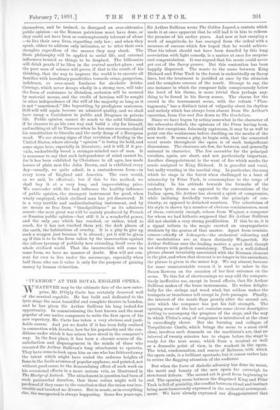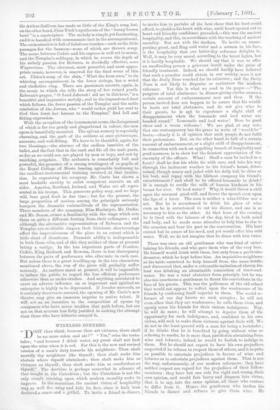" IVANHOE " AT THE ROYAL ENGLISH OPERA.
HATEVER may be the ultimate fate of the new enter- prise, Mr. D'Oyly Carte has certainly deserved well 'of the musical republic. He has built and dedicated to the lyric stage the most beautiful and complete theatre in London, and he has given Sir Arthur Sullivan his long looked-for .opportunity. In commissioning the best known and the most popular of our native composers to write the first opera of his new repertory, Mr. Carte has taken a very obvious and justi- fiable course. And yet we doubt if it has been fully realised in connection with Ivanhoe, how far his popularity and the con- ditions under which it has arisen have stood in the composer's way. In the first place, it has been a chronic source of dis- satisfaction and disparagement in the minds of those who resented Sir Arthur Sullivan's long attachment to operetta. They have come to look upon him as one who has frittered away the talent which Might have scaled the arduous heights of fame in the facile avenues of popular applause, and pointed, not without good cause, to the demoralising effect of such work on his occasional efforts in a more serious vein, as illustrated in The Martyr of Antioch. The attachment in question had been of such patriarchal duration, that these critics might well be pardoned if they came to the conclusion that the union was irre- vocable and brooked no divorce. But in music, as in everything else, the nnexpected is always happening. Some five years ago, Sir Arthur Sullivan wrote The Golden Legend, a cantata whioh made it at once apparent that he still had it in him to redeem the promise of his earlier years. And now at last essaying a work of magnitude, he has emerged from the ordeal with a measure of success which few hoped that he would achieve. That his talent should not have been dwarfed by this long association with light comedy, is a matter at once for surprise and congratulation. It was argued that his music could never get out of the Savoy groove. But this contention has been happily disproved. The music to the scene between King Richard and Friar Tuck in the forest is undoubtedly on Savoy lines, but the treatment is justified at once by the situation and the complete success of the result. Strange to say, the one instance in which the composer falls conspicuously below the level of his theme, is more trivial than perhaps any- thing to be found in his Savoy scores. The chorus for the crowd in the tournament scene, with the refrain " Plan- tagenesta," has a distinct taint of vulgarity about its rhythm and melody which has always been absent from Sir Arthur's operettas, from Cox and Box down to The Gondoliers.
Since we have begun by acting somewhat in the character of the advocatue diaboli, the opinions of the Press having been, with few exceptions, fulsomely rapturous, it may be as well to point out the weaknesses before dwelling on the merits of the new work. It seems a pity, to begin with, that the concerted vocal music throughout the opera is of such insignificant dimensions. The choruses are few, far between, and generally unisonal in character. The few ensembles for the principal vocalists, again, are short, and not particularly important. Another disappointment is the want of fire which marks the music assigned to King Richard. It is graceful and vocal, but sadly wanting in the martial ring. In particular, the song which he sings in the forest when challenged to a bout of minstrelsy by Friar Tuck, is commonplace to the verge of triviality. In his attitude towards the formulas of the modern lyric drama as opposed to the conventions of the Italian opera, Sir Arthur has showed a spirit of compromise, while inclining decidedly towards the principle of con- tinuity, as opposed to detached numbers. The eclecticism of his style is shown by a number of obvious reminiscences, most of them, curiously enough, echoes from Wagner, a composer for whom we had hitherto supposed that Sir Arthur Sullivan did not cherish a very strong predilection. If this be so, it is a signal tribute to the magic exerted on unsympathetic students by the genius of that master. Apart from reminis- cences—chiefly of Lohen grin—the orchestral colouring and the modulations are at times distinctly Wagnerish. Sir Arthur Sullivan uses the leading motive a good deal, though not always with perfect consistency. There is a well-defined phrase almost invariably associated with the Norman element in. the plot, and when that element is no longer in the ascendant, the phrase is given in the minor key. We say almost, because for some unaccountable reason it is used to usher in the Saxon Rowena on the occasion of her first entrance on the scene. To this list of shortcomings we may add the compara- tively ineffective use, except in broad effects, that Sir Arthur Sullivan makes of the brass instruments. He writes delight- fully for the strings and wood wind, but seldom makes the trumpets or trombones tell except in forte passages. Finally, the interest of the music flags greatly after the second act, into which the composer has put his full strength. The opening scene of the last act contains some clever descriptive writing to accompany the progress of the siege, and the way in which Ulrica's song of vengeance is introduced at the close is exceedingly clever. But the burning and collapse of Torquilstone Castle, which brings the scene to a most vivid close, involves such demands on the machinist's art, that an interval of twenty minutes has to elapse before the stage is ready for the next scene, which from a musical as well as a dramatic point of view, is the weakest in the opera. The trial, condemnation, and rescue of Rebecca, with which the opera ends, is a brilliant spectacle, but it comes rather late to revive the flagging attention of the audience.
But when the force of diabolic advocacy has done its worst, the merit and beauty of the new opera far outweigh its structural defects. The second act is good from beginning to end. The opening scene between the disguised King and Friar Tuck is full of geniality, the conflict between ritual and instinct being most humorously expressed in the orchestral accompani- ment. We have already expressed our disappointment that Sir Arthur Sullivan has made so little of the King's song, but, on the other hand, Friar Tuck's apotheosis of the " bonny brown bowl " is a masterpiece. The melody is simple yet fascinating, and it is handled with consummate tact in the accompaniment. The orchestration is full of felicitous touches—such as the little passages for the bassoon—none of which are thrown away. The scene between Cedric and his captors is well set to music, and the Templar's soliloquy, in which he avows the depth of his unholy passion for Rebecca, is decidedly effective, more Wagnerian°. The cleverest, most powerful, and most appro- priate music, however, is reserved for the final scene of this act. Ulrica,'s.song of the slain, " Whet the keen axes," to its whirring accompaniment in the lower strings, has -a weird and vindictive ring. There are passionate accents, again, in the music to which she tells the story of her ruined youth. Rebecca's prayer, " 0 Lord. Jehovah aid me in this hour," is a beautiful and impressive melody; and in the impassioned duet which follows, the fierce passion of the Templar and the noble resolution of the Jewess, who " would rather yield her.soul to God than trust her honour to the Templar," find full and fitting.expression.
With the exception of the tournament scene, the foreground of which is far too gaudy and gingerbread in colour, the new opera is beautifully mounted. The sylvan scenery is especially charming, and the garb of the outlaws at once picturesque, accurate, and well-fitting. We have.to be thankful, again, for two blessings,—the absence of the endless inanities of the ballet, and thefaet that in the rank and file all the male parts, so far as we could see, are played by mon or boys, and not by smirking coryphges. The orchestra is remarkably full and powerful, the presence of a strong contingent of ex pupils of the Royal College of Music bearing agreeable testimony to the excellent instrumental training received at that institu- tion. In organising his company, Mr. Carte has shown a most laudable anxiety to enlist competent recruits on all sides. America, Scotland, Ireland, and Wales are all repre- sented in his troupe. This generous policy may, and we hope will, hear good fruit in due time ; but for the present, the large proportion of novices among the principals seriously hampers the dramatic verisimilitude of the representation. Three members of the company, Miss Macintyre, Mr. Catlin, and Mr. Saxon, evince a familiarity with the stage which sets them on quite a different footing from their colleagues ; and although the -alternative representatives of Rebecca and the Templar are creditable singers, their histrionic shortcomings affect the impressiveness of the piece to an extent which is little short of disastrous. Dramatic ability is indispensable in both these roles, and of this they neither of them at present betray a vestige. In the less important parts of -Ivanhoe, Cedric, King Richard, and Rowena, there is less discrepancy between the pairs of performers who alternate in each case. But unless there is a great levelling-up in the two characters mentioned above, the run of the piece will probably suffer seriously. As matters stand at present, it will be impossible to induce the public to regard the less efficient performers otherwise than as under-studies. And anything calculated to exert an adverse influence on so important and spirited an enterprise is highly to be deprecated. If Ivanhoe succeeds,,as it certainly deserves to succeed, the opening of Mr. Carte's new theatre may give an immense impulse to native talent. It will act as an incentive to the composition of operas by composers who have never trodden that path before, but are not on that account less fully justified in making the attempt than those who have hitherto essayed it.











































 Previous page
Previous page